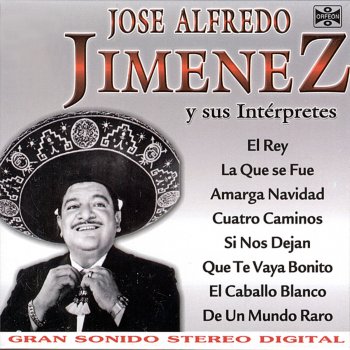

In his early teens, he peddled ladies' footwear throughout the Santa María la Ribera section of Mexico City, and in his free afternoons sang with a trio known as Los Rebeldes. Heriberto Molina, violinist and vocal soloist of the world famous Mariachi Vargas de Tecalitlán, was a close friend of José Alfredo for many years and regarded him as something of a hero, not only in his role as a well known singer-composer, but as a man who had to struggle every inch of the way down the long, hard road to acceptance and ultimate recognition.During the early years of his career, José Alfredo worked as a shoeshine boy, truck loader, busboy, and waiter. This soon proved futile and José Alfredo's mother, Carmelita Sandoval, moved with her four children to Mexico City in 1939.Having completed his elementary education, José Alfredo began to take on any and all jobs he could find, hoping to help support the family. Jiménez had to struggle every inch of the way down the long, hard road to recognition.His father, Agustín, who owned and operated a small drugstore, died in 1936, leaving the family nearly destitute and forcing them to sell the store and search for other means of sustenance. At one time, José Alfredo's parents entertained hopes that he would eventually study to become a doctor, but his disinterest in his schoolwork and his passion for composing verses about the heroic deeds of his hometown quickly put an end to such thinking. But when he thinks of the authors of such songs, the name of José Alfredo stands out as probably the greatest of all composers of canciones rancheras.The wealth of his songs appearing in Mexican cancioneros (song books) and the number of artists who have not only made hit recordings of his songs but have dedicated entire LPs and concerts to his music attest to his importance in the history of Mexican popular music since 1946.Early YearsJosé Alfredo Jiménez Sandoval was born on January 19, 1926, in Dolores Hidalgo, Guanajuato, the site of the 1810 insurrection of Father Miguel Hidalgo and the local Indian peons against the Spanish rulers. He is a scholar in the field of Colombian regional folk music and mariachi history.When the aficionado of Mexican music thinks of the canción ranchera (ranch song), he thinks of singers like Pedro Infante, Lucha Reyes, Javier Solís, Miguel Aceves Mejía, Amalia Mendoza, Jorge Negrete, Lucha Villa, José Alfredo Jiménez, and others. Reprinted with permission.William Gradante has taught mariachi and classic guitar since 1980 in Fort Worth, Texas.
#Jose alfredo jimenez canciones full
Reprinted by permission.This article is excerpted from its full version, which was originally published in the Volissue of Studies in Latin American Popular Culture.

José Alfredo Jiménez and the Canción RancheraOriginally published in the MENC February and May 2008 Mariachi Newsletters.


 0 kommentar(er)
0 kommentar(er)
